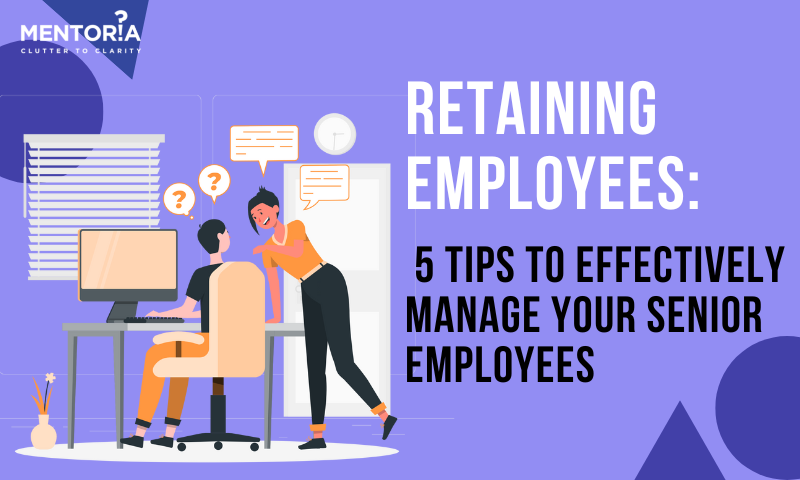Retaining Expertise: 5 Tips to Effectively Manage Your Senior Employees

Laya has just joined her dream company as a team lead. She is really excited to meet her team members and start working with them. The team includes employees with varying levels of experience. Naturally, some of the team members have been with the company for far longer than her. As she proceeds with her responsibilities, she finds it increasingly difficult to establish a rapport with senior team members without sounding condescending.
This is not just the case with Laya. Over the years this has been the untold truth of the corporate world. Freshers always feel the pressure to both fulfil their duty and at the same time manage the senior employees at their company.
Earlier, this sort of internal conflict was easily avoided as the hierarchy was determined by age. However, with time, things have taken a different turn. Younger candidates with higher qualifications are joining the company in higher positions. It is becoming really challenging for such employees to manage senior employees who are working under them.
Have an Open Mind
Nothing irks a senior employee more than being treated with prejudice. It’s best to avoid making any assumptions like they are close-minded people who cannot handle change or are unadaptable, and you have to refrain from discussing any innovative ideas with them. If you are concerned then try to build a context for them before initiating any discussion. Make sure that senior employees have access to the information they need to make informed decisions, and encourage open and honest communication about the decision-making processes. Create an environment where all employees, irrespective of age and hierarchy, feel comfortable sharing their ideas and opinions. This can help to promote an open-minded and inclusive culture.
Leverage Their Experience
Senior employees often have a wealth of knowledge and experience that can be valuable to the organisation. Consider assigning them to projects where their skills and experience can be leveraged to achieve business objectives. Involve senior employees in decision-making processes and solicit their feedback and ideas. As a manager it is essential that you accept constructive feedback, this will go a long way in helping you understand your flaws and in correcting them. By collecting feedback from your senior employees, you will be able to understand how to help them feel comfortable in the corporate culture. Their perspectives can be valuable for the growth of your company. Consider pairing senior employees with junior employees to provide guidance and support. You can organise mentorship programs, this will help your junior employees understand the ins and outs of their profession, and also serve as a window for the senior employees to exhibit their knowledge. Senior employees often have established networks and relationships that can be valuable to the organisation. Encourage them to leverage these connections to identify new business opportunities or partnerships.
Make Them Feel Valued
Older employees are prone to feel that the company does not value them enough. They may feel out of place in a company dominated by younger corporates with different lifestyles and minds. Rather than sending a thank you card or a happy birthday card once every year, take steps to show them that they are essential for the company’s growth. For instance, you can put up a snapshot board every month with a senior employee’s picture depicting some important event during their tenure with the company.. This will not just help break the ice between the senior employees and the freshers but also help the former feel valued.You can also put aside one hour for the employees to get to know each other, this will also help the employees to build a rapport with each other, which in turn will help their productivity. you can create platforms for them to share their knowledge with other employees. This will make the senior employees break the ice with new recruits and help them feel valued and respected by the company.
Understand What Motivates Them
Occasional motivation classes are essential for everyone, especially corporates. It is easier to feel stuck behind a desk, and lose all zeal in your work. This is especially true in the case of senior workers. Your senior employees might be going through a lot of stress both in their personal and professional lives. They may be dealing with a midlife crisis or some other issues. They may feel that they are stuck without escape in a mundane job, which demands their attention every second of the day, which might in turn affect their professional career. As a manager it is your responsibility to motivate them to perform their best at their job. Allow them to have a healthy autonomy in the company, include them in setting goals, appreciate them when they complete a task successfully, all these will contribute to building their job satisfaction and help them feel valued by the company. Provide them with the support and resources they need to be effective decision makers, such as training and development opportunities.
Give Them Responsibilities Not Tasks
Most managers can’t differentiate between giving your employees more responsibility and allotting them more tasks. When you allot your senior employees more tasks they will eventually drain themself. In contrast to this, when you allot them projects that they care about, it gives them a sense of purpose. This helps your senior employees be more goal oriented. You can also seek their help in setting up realistic goals for your company. All these will make your senior employees feel valued and this in turn will increase their productivity.
Get More Help And Tips From Mentoria!
Are you finding it hard to manage your employees? Then we could have the best solution for you at Mentoria. We can help you build a productive environment and help you retain your precious employees







